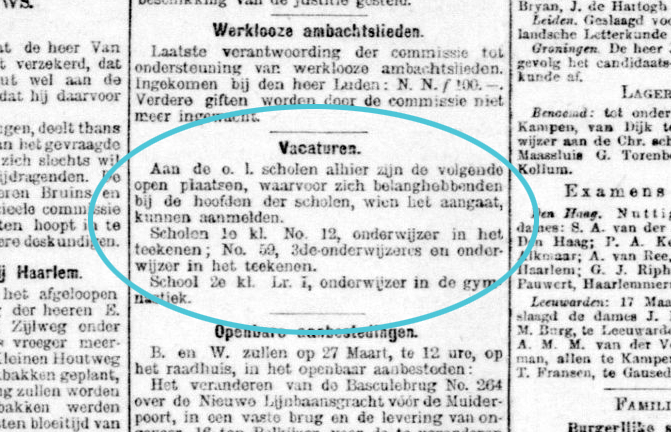Within the Europeana Newspapers project, we often speak of the value of historic newspapers for the academic community but how exactly might a researcher use the material that we’re gathering?
To answer that question, we’re interviewing researchers about their work with historic newspapers.
Wiebke Schulz used job advertisements in historic newspapers as one source when researching her PhD thesis on the Careers of men and women in the 19th and 20th centuries.
 Can you tell us about your work?
Can you tell us about your work?
In my dissertation I studied social mobility over the life course in the past and especially the long-term development of social mobility. Sociological theories claim that during the period of modernisation, roughly in the 19th and 20th centuries, tremendous social changes happened and these are assumed to have had an impact on the mobility outcomes of individuals.
In the period before modernisation, people were born into a certain family and social class. There was not much opportunity to improve their social position over the course of their career. Modernization theories argue that, due to the changes that occurred, people had more chances to have an occupation which was different from that of their parents and to make life choices that were different from those of their parents. My goal was to provide an empirical test of these ideas. My dissertation presents the first ever historical description and test of classic theories in the field of status attainment over the working life of the Dutch population at large.
How did historic newspapers fit into your work?
In one chapter of my dissertation, we wanted to focus on the role of the employer. According to modernization theories, employers would increasingly recruit based on qualifications rather than background characteristics such as religious affiliation and social class. We therefore needed a source that covered a variety of occupations, employers and a long period of time. Job advertisements from historic newspapers are an excellent source. Job ads include information on the occupation and tasks that a potential employee has to execute and information on requirements.

Did you use paper newspapers or digitised archives, and how easy was the process for you?
We used the digital newspaper archive of the Royal Library of the Netherlands and the archive of the Leeuwarder Courant.
The main challenge for us was related to the types of newspapers that were digitised. We needed papers that covered different social groups so we wanted to include the newspaper read by the socialist labourer but also the newspaper read by the Protestant middle class. It was a challenge to collect a sample of advertisements that allowed us to make general claims on the recruitment of employees in the Netherlands via job advertisements.
What would you like to see for digitised historic newspapers in future?
The historic newspapers we used were digitised but they weren’t processed in a way that allowed us to could search them by keyword. We had to go through every newspaper and re-type the content of the advertisements. That was quite a lot of work. Improvements in this area would be really helpful.
Will you continue to research aspects of social mobility?
Yes, there are so many interesting questions to be studied, in our current society but also in a long term perspective like we did with the newspaper ads. My co-authors Marco van Leeuwen & Ineke Maas are planning to continue doing research using historic newspapers as a data resource. Their website gives more information about their research projects.
Wiebke Schulz (1983) studied sociology at Bremen University, the University of Liverpool and Utrecht University. Her dissertation “Careers of men and women in the 19th and 20th centuries” was conducted at the Interuniversity Center for Social Science Theory and Methodology (ICS) in Utrecht. Currently, she is employed as post-doctoral reasearcher in the TwinLife project (Bielefeld University/DIW Berlin).
